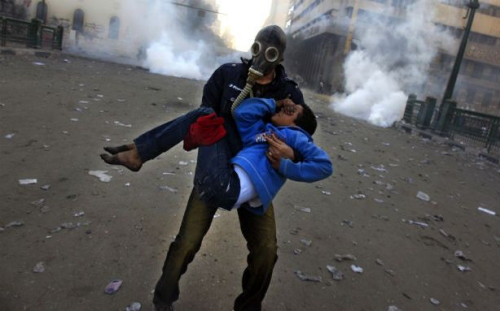
At the time of writing the wave of outrage over the killing of 73 young football supporters in Port Said on 2 Feb 2012, a year to the day after the Battle of the Camels in Tahrir Square, is still raging around the Interior Ministry in Cairo.
by Connor T. Jerzak
From subversive to revolutionary
Uprisings in Tunisia provided the spark for the 2011 Egyptian Revolution. Much media and scholarly attention has focused on the role of middle class youths and social networking technologies in the Revolution (Aitamurto 2011; Howard and Hussain 2011). Fewer commentators noted the crucial but unexpected role of Ultra groups. Indeed, Ultra groups became a surprisingly central protagonist in the Egyptian Revolution by bringing their organizational unity, fighting experience, and rebellious ethos to demonstrations. As they played a central role in the Revolution, Ultras became increasingly politicized, seeking to eliminate the presence of the authoritarian state in public space through large-scale demonstrations. After all, as Egyptian blogger Alla Abd El Fattah stated in a 2011 interview, “The Ultras have played a more significant role” in the Egyptian Revolution “than any political group on the ground” (Zirin 2012b). Read the rest of this entry
by Connor T. Jerzak1
Abstract
In this article, I explore the relationship between organized soccer fans—Ultras—and the Egyptian state. I argue that Ultra groups became politicized as they sought autonomy in public space, but faced resistance from Egyptian security forces. To make this argument, I trace the history of Ultra groups. I show how Ultras made relatively few political statements in the first years after their 2007 inception. However, these groups become increasingly politicized in reaction to police harassment. This harassment was motivated by the fact that Ultras subverted state control over public spaces. The events of the 2011 Arab Spring further politicized the Ultras and transformed them into revolutionary actors by giving them the opportunity to delegitimize the authoritarian state’s entire presence in public space. However, the greater public visibility of Ultras came at a cost, partially fracturing Ultra groups and giving state forces a desire for retaliation that was realized in the Port Said massacre. Despite these challenges, Ultra groups have continued to seek autonomy in public spaces, protesting authoritarian tendencies in the post-Mubarak era. I conclude with an afterward, explaining how Ultras not only defy authoritarianism in Egypt, but also dominant narratives about Egyptian society.
 Read the rest of this entry
Read the rest of this entry
by Jerome Roos on January 25, 2013
 If there is one lesson we have to learn from the endless struggle of the Egyptians, it is this: don’t rely on anyone to make your revolution for you.Indefatigable. That’s probably the word that best describes Egypt’s revolutionaries, two years since the start of their revolt. Fearless and heroic are some others that instantly come to mind. Firmly committed to their cause. Fully conscious of the immense obstacles. Fiercely determined to succeed. There are many things we savages in the West can learn from our brothers and sisters in Egypt. The most important, perhaps, is never to give up in the face of seemingly insurmountable odds. People died for this revolution. It will not be hijacked by those who piss on their legacy. Read the rest of this entry
If there is one lesson we have to learn from the endless struggle of the Egyptians, it is this: don’t rely on anyone to make your revolution for you.Indefatigable. That’s probably the word that best describes Egypt’s revolutionaries, two years since the start of their revolt. Fearless and heroic are some others that instantly come to mind. Firmly committed to their cause. Fully conscious of the immense obstacles. Fiercely determined to succeed. There are many things we savages in the West can learn from our brothers and sisters in Egypt. The most important, perhaps, is never to give up in the face of seemingly insurmountable odds. People died for this revolution. It will not be hijacked by those who piss on their legacy. Read the rest of this entry 
At the time of writing the wave of outrage over the killing of 73 young football supporters in Port Said on 2 Feb 2012, a year to the day after the Battle of the Camels in Tahrir Square, is still raging around the Interior Ministry in Cairo.